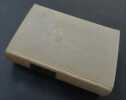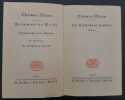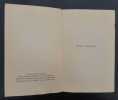1145 books for « mann j j »Edit
-
Type
Book (1127)
Music sheets (18)
-
Latest
Last 3 days (22)
Last month (45)
Last week (3)
-
Language
English (6)
French (1103)
German (3)
Russian (33)
-
Century
18th (5)
19th (6)
20th (642)
21st (56)
-
Countries
Belgium (65)
Canada (4)
Côte d'Ivoire (2)
Denmark (16)
France (931)
Germany (2)
Greece (1)
Netherlands (2)
Switzerland (89)
United States of America (33)
-
Syndicate
ALAC (4)
CLAM (4)
CLAQ (2)
ILAB (584)
NVVA (10)
SLACES (10)
SLAM (546)
Topics
- Abraham (2)
- Alps (2)
- Alsace (2)
- Architecture (2)
- Autographs (8)
- Betrayal (2)
- Buildings (1)
- Chemistry (2)
- Cinema (5)
- Customs (2)
- Death (1)
- Early printed books (2)
- English (3)
- Engraving (books about) (2)
- Erotic (6)
- Esotericism (2)
- Essays (6)
- Ethic (2)
- Fashion (2)
- Fine arts (4)
- First edition (23)
- Flemish (2)
- Franco (1)
- Genealogy (3)
- Geography (2)
- German history (3)
- German literature (1)
- Germany (5)
- Germany pc (2)
- Gide andré (1)
- Goethe johann wolfgang (4)
- Gold (2)
- Guide books (3)
- Hackney (4)
- Hebraic literature (3)
- History (20)
- Hitler (4)
- Home economics (1)
- Illustrated books (2)
- Israel (4)
- Literature (15)
- Magazine (6)
- Mann abby (3)
- Mann thomas (1084)
- Manuscripts (3)
- Memmi albert (1)
- Memories (3)
- Military arts (2)
- Miller (3)
- Music (2)
- Navy (2)
- Nazism (5)
- Newspaper (3)
- Newspapers press (9)
- Nietzsche frédéric (4)
- Nuremberg (2)
- Paris (2)
- Philosophy (10)
- Physics (3)
- Picasso (3)
- Policy (2)
- Psychology (5)
- Religions (4)
- Review (6)
- Reviews (6)
- Romance (5)
- Sciences (5)
- Scores (22)
- Sculpture (1)
- Social sciences (1)
- Songs (18)
- Soul (1)
- Tea (2)
- Testimonies / stories (3)
- Theatre (3)
- Theology (2)
- War (15)
Thomas Mann. Mann T. Joseph in Egypt. Volume II.Joseph in Egypt.Part 2. In Russ
Thomas Mann. Mann T. Joseph in Egypt. Volume II.Joseph in Egypt.Part 2. In Russian /Thomas Mann. Mann T. Joseph in Egypt. Volume II.Iosif v Egipte.Chast 2. New York Alfred A. Knopf publishing 1938 672 p. We have thousands of titles and often several copies of each title may be available. Please feel free to contact us for a detailed description of the copies available. SKUalbddbaf0c36c1969f0.
DIETRICH, Marlene - AUDEN,W. H., COWARD, Noël, HEMINGWAY, Ernest, MANN, Heinrich, MANN,Thomas, PAUSTOVSKY, Konstantin, REMARQUE, Erich Maria, RILKE, Rainer Maria, STERNBERG, Josef von.
Reference : 3758
(1960)
EXCEPTIONAL SET OF NINE BOOKS INCRIBED WITH MARLENE DIETRICH'S AUTOGRAPH SIGNED RECOLLECTIONS (two to four pages in length each) of her relationship with their authors :
Exceptional set of nine books inscribed with Marlene Dietrich’s autograph signed recollections (two to four pages in length each) of her relationship with their authors, each of whom has played a prominent role in Dietrich’s life, including former lovers, very close friends and writers whose works had made the most thorough impression on the actress. Each volume has been specially selected around the year 1979 by Dietrich among the books owned by a friend of hers. This set reflects in a unique way the passions of one of the most iconic actress of the twentieth century. - It includes: - 1. AUDEN (W. H. ). Collected Shorter Poems 1927-1957. New York, Random House, [1967]. Inscribed in black felt pen by Marlene Dietrich: « A true friend in special, difficult times ; also a favorite writer - although his style is so different from other great poets! Just shows you how varied my taste was, - and is! » - 2. COWARD (Noël). Pomp and Circumstance. Garden City, Doubleday, 1960. Inscribed in black felt pen by Marlene Dietrich: « When he introduced my performance at the “Café de Paris” in London it seemed to me as if a king had stepped down from his throne to help up a fallen commoner: We were friends for many, many years. Not even our travelling to many different countries could devide us! After his coming to rest in Switzerland I almost lived there between my professional escapades. I relied on his advice and I always felt guilty that I could do nothing in return. He insisted though, that my presence, near or far, had become a necessity for him, his mind, his phantasies! Maybe he made this up in order to minimize my guilt. I am grateful that I was not there when he died! My usual courage failed. » - 3. HEMINGWAY (Ernest). For whom the bell tolls. New York, Collectors Reprints, [1968]. Inscribed in black felt pen by Marlene Dietrich: « He wrote about me : “In this life Dietrich makes her own rules - but her own laws of decency and conduct in human behavior and relations are not less strict than the original ten.” This is one of the reasons he chose me to be his friend and intimate ». - 4. MANN (Heinrich). The Blue Angel. The novel by Heinrich Mann. The film by Josef von Sternberg. New York, Frederick Ungar, 1979. The volume includes The Blue Angel, English translation of Heinrich Mann’s Professor Unrat, and the English script of Der blaue Engel, its adaptation made by Josef von Sternberg. The book on which was based the movie to which Marlene Dietrich owned the iconic role which made her famous. Inscribed in black felt pen by Marlene Dietrich: « A sad man - living in the shadow of his famous, highly talented brother. He had a rare stream of contentment when his book “Professor Unrat” was chosen by Mr. von Sternberg for the first sound-film in Germany - as a vehicle for the famous star Emil Jannings. He felt very honoured and grateful to Mr. von Sternberg, and gave him “Plein-Pouvoir” to make all the changes he wanted - character and story changes. I never saw him again after the film called “BLUE ANGEL” was filmed in its final form, but I heard that he was not in the least upset regarding the drastic changes his book suffered in the version that made the film a lasting classic. - 5. MANN (Thomas). The Magic Mountain. Translated from the German by H. T. Lowe-Porter. With an introductory essay by the author. Illustrated with wood engravings by Felix Hoffmann. The Heritage Press, New York. Inscribed in black felt pen by Marlene Dietrich: “To read all the books written by Thomas Mann belonged to the higher education I received. I was fascinated by the “BUDDENBROCKS”, but the “MAGIC” of this book made me dizzy with admiration, or to use his words “light-hearted”! What he said of his hero I felt like “Life’s delicate child”. - 6. PAUSTOVSKY (Konstantin). Story of a Life. Childhood... Translated by Manya Harari and Michael Duncan. London, Harvill Press, 1964. Picture of Dietrich and Paustovsky at Moscow in 1964. Inscribed in black felt pen by Marlene Dietrich: « I am still on my knees at his feet like I was in Moscow when he came onto the stage at the end of my concert. I had read his books and found my own passions brilliantly described as his own! I had written to him long before I went on tour to Russia, but I never dreamt of meeting him - let alone feeling his hands touch mine! » - 7. REMARQUE (Erich Maria). All Quiet on the Western Front. Translated from the German by A.W. Wheen. New York, Grosset & Dunlap [reprint of the 1930 edition]. Picture of Dietrich and Remarque. Inscribed in black felt pen by Marlene Dietrich: « My great friend and “COMRADE IN ARMS”. Remember: his books were burnt at the historical “REICHTAGS-FIRE”. I arranged for his untroubled stay in America and it amused him when he caught me re-reading his books over and over again in the three languages I knew, “All quiet” and “The Road back” in particular. He was so full of complexes that I thought it my duty to eliminate at least some and I was proud when I succeeded. A sentimental gentleman he was. His favorite song: “Que reste-t-il de nos amours”. Also at the end of “All quiet on the Western Front” the Butterfly -. (Apart from the irony). He was a timid man and undemanding — Easy to live with. What a Loss! » - 8. RILKE (Rainer Maria). Translations from the Poetry of Rainer Maria Rilke by M.D. Herter Norton. New York, W.W. Norton, [1938]. Inscribed in black felt pen by Marlene Dietrich: « His is my God!! His writings, but especially his POEMS, ALL HIS POETRY helped me through the dark hours of life making my constant enthusiasm chase away all the melancholy my realism evokes daily. - I know all poems by heart and I take special delight in his unequaled choice of words and descriptions of his subjects, but also the “double-ryme” he invented - like a magician creating visual events and observations, rising out of the printed word, into living reality, right in front of your eyes! Sheer Delirium!! » - 9. STERNBERG (Josef von). Fun in a Chinese Laundry. New York, The Macmillan Company, [1965]. First edition of this autobiography, by the director who made Marlene Dietrich famous and made several of her greatest movies. Inscribed by Marlene Dietrich: « I quote the “FEMME FATALE” he made of me in Hollywood: “THE MAN I WANTED TO PLEASE MOST”. THERE I was alone - THERE he was the ultimate Tyrant at the studio. REASON: he knew about all the intricate parts of everything involved in Film-creation. Better than anybody - camera-men, lighting-men, (scriptwriters too) and he did not hide that fact! He had some patience with actors, but they hated him too: superiority is not easy to love. The INFERIORITY-COMPLEX, hidden in every human mind does not allow to love the man who knows all. - I am the exception to the rule! I loved him, I respected him, I bowed to his unusual behavior and I admired and worshipped his knowledge and wisdom. Both were the cause of his troubled existence. I cried a lot though! That’s when he said: “Everybody go to lunch Miss Dietrich is crying.” He did not pity me - then ».
More pictures on request.
ALEXANDRE. Roman de l'Utopie. Traduit de l'allemand par RALPH LAPOINTE. Préface de Jean Cocteau.
Paris, Librairie Stock, Delamain et Boutelleau, Editeurs, 1931, 1 volume in-8 de 245x182 mm environ, xi-254 pages, broché. Exemplaire nominatif, un des 23 exemplaires sur Japon ancien à la forme. Couverture insolée avec rousseurs sur le dernier plat plis de lecture et début de fente sur le dos, une mouillure et frottements au bas du dos avec atteinte dans la marge interne sur les 17 derniers feuillets, tranches un peu salies, sinon bon état intérieur.
Klaus Heinrich Thomas Mann, né le 18 novembre 1906 à Munich, mort le 21 mai 1949 à Cannes, est un écrivain allemand. Il est le fils de l'écrivain Thomas Mann, le neveu de Heinrich Mann et le frère, entre autres, d'Erika et Golo Mann. Merci de nous contacter à l'avance si vous souhaitez consulter une référence au sein de notre librairie.
Appels aux Allemands.
Exemplaire de tête de Georges Pompidou, signé par Thomas Mann Paris, Éditions Flinker, (30 septembre) 1948. 1 vol. (145 x 230 mm) de 219 p. Broché, non coupé, sous chemise et étui (Gauché). Edition originale de la traduction française par Pierre Jundt. Un des 60 premiers exemplaires sur vergé (n° 9). 31539 Il est signé par Thomas Mann.
Entre 1940 et 1945, exilé aux États-Unis, Thomas Mann adresse 56 messages radiophoniques mensuels en allemand, diffusés par l'Office of War Information : des allocutions qui visent à éveiller la conscience du peuple allemand face aux atrocités nazies. Dans des formules incisives, Mann qualifie le régime nazi de « système abominable, fondé sur le mensonge, la rapine et l'assassinat », et décrit Hitler comme « un misérable charlatan de l'histoire ». L'on retrouve ici la plume qui s'en était pris depuis 1933 à Hitler. Sa propre préface, écrite à mi-parcours (1942) et présente en tête de l'édition, laissait entendre ses doutes : « Appeler un peuple à la révolte, ce n'est pas encore croire du fond du coeur qu'il en soit capable ». Dès 1946, ces textes sont traduits en français par Pierre Jundt, professeur agrégé d'allemand et connu pour ses traductions d'oeuvres théologiques et littéraires, afin d'être publiées par les Éditions Flinker, tout juste créés en 1947 par Martin Flinker (1895-1986), libraire et critique littéraire d'origine autrichienne qui avait fuit Vienne en 1938 avec son fils Karl. Outre son activité éditoriale, Martin Flinker a également publié plusieurs essais d'écrivains tels que Paul Celan, Joseph Breitbach, Robert Musil et Joseph Roth, contribuant ainsi à la promotion de la culture germanique en France. Son fils poursuivra l'héritage familial en fondant une galerie d'art à Paris, la Galerie Karl Flinker, qui a exposé des artistes majeurs tels que Kandinsky, Klee et Kupka. L'ouvrage est précédé d'une introduction critique d'Edmond Vermeil, résistant et compagnon du général de Gaulle à Londres, spécialiste de l'histoire et de la civilisation allemandes à la Sorbonne. De la bibliothèque de Georges Pompidou, avec ex-libris.
Mann G. Small Town. In Russian /Mann G. Malenkiy gorod.
Mann G. Small Town. In Russian /Mann G. Malenkiy gorod. Translation of Onegsky. Moscow 1911. We have thousands of titles and often several copies of each title may be available. Please feel free to contact us for a detailed description of the copies available. SKUalb8e0fadc6d28958e6.
Mann T. Its a war In Russian /Mann T. Eta voyna
Mann T. Its a war In Russian /Mann T. Eta voyna M. Cheapcherrylibrary 2022. 50 p. We have thousands of titles and often several copies of each title may be available. Please feel free to contact us for a detailed description of the copies available. SKUalb2bd28e1144f36409.
Mann G. Young Years of King Henry 4. Mature Years of King Henry 4. In Russian /
Mann G. Young Years of King Henry 4. Mature Years of King Henry 4. In Russian /Mann G. Molodye gody korolya Genrikha 4. Zrelye gody korolya Genrikha 4. The novel The Young Years of King Henry IV (1935) by the largest German writer Heinrich Mann is the first part of a historical dictionary devoted to one of the brightest and most dramatic pages of French history - the Reformation era and the religious wars of the second half of the sixteenth century. The first book of the diology describes the spiritual formation of the hero Henry of Navarre, the future King Henry IV. The novel The mature years of King Henry IV (1937) is the second part of Henry Manns historical dictionary.We have thousands of titles and often several copies of each title may be available. Please feel free to contact us for a detailed description of the copies available.SKUalb149facd82d885825.
Mann T. Dr. Faustus. In Russian /Mann T. Doktor Faustus.
Mann T. Dr. Faustus. In Russian /Mann T. Doktor Faustus. Translation with him. M In.lit. 1959.We have thousands of titles and often several copies of each title may be available. Please feel free to contact us for a detailed description of the copies available.SKUalb025913d9910668f1.
Mann T. On Germans and Jews. In Russian /Mann T. O nemtsakh i evreyakh.
Mann T. On Germans and Jews. In Russian /Mann T. O nemtsakh i evreyakh. Articles, Speeches, Letters, Diaries. L.Dymerskaya-Ziegelman, E.Fradkin. Jerusalem ALIA Library 1990. We have thousands of titles and often several copies of each title may be available. Please feel free to contact us for a detailed description of the copies available. SKUalb76ff5f096f8f3d18.
Two manuscript journals of travels on Continental Europe, including Waterloo, Cologne, the Rhine, the Alps, Geneva, Chamonix and Mont Blanc, and Italy,
ca. 1853 - 1858. in-8vo, First journal: 90 leafs illustrated with: 18 dried plants (with name and origin), 14 hand-coloured aquatints or engravings, 11 uncoloured engravings, 1 chromolith. of the Strassbourg clock, 6 tinted lithographs.Second journal: 78 leafs illustrated with: 3 dried plants, 11 hand-coloured aquatints or engravings, 19 uncoloured engravings and two photographs of paintings. Contemporary half calf / Contemporary limp calf,
Each manuscript is dated on its first page and has the name ,Bertha Henrietta Horatio Mann’ on it. Bertha Mann was the daughter of Horatio Mann, Rector of Mawgan in Meneage, the youngest of 8 children, born in 1836 in Cornwall. However at the time of these travels the family was living at ,Winchester House’, Newchurch, Isle of Wight, and the father had died. The Mann family appear from the 1851 census to have been living in some style, with a footman, ladies maid, housemaid and cook. Bertha travelled with her sister and they were also accompanied by ,Henry’, who organised their travels but is otherwise untraceble The sisters first tour began April 19th 1854, leaving Dieppe and visiting Waterloo: „a few trees still remain and bear marks of the French cannon-shot“. One of the dried plants was collected at Waterloo. They travel to Cologne, take a steamer up the Rhine and, among other places, visit the house of Frankfurt where the Family has once lived and where their brother „dear Horatio“ had had a fatal accident aged 14. Bertha begins her account in English, but about half way through switches to German. The tour ends in October. Appended to this tour is an account of an earlier tour, begun August 30th 1854, from Dieppe to the Alps, with visits to Geneva, Courmayeur, Chamonix and Aosta. They visit the ,Mer de Glace’ on mules: „when we arrived at Montanvert we descended and walked a little way on the Mer de Glace with the help of the guide’s hand and Alpenstock... „They ascended the Col de la Seigne „summit of the Brevent 8500 ft. above the sea level“, making long journeys on mules. Bertha collected plants on the Montanvert, the Brevent, and Chamonix, and three of these feature in the album, each identified and dated by her.In 1858, Bertha set off again with her sisters Sophia, Ada, Louisa and with Henry. Bertha describes a visit in Florence, such as the Grand Duke’s Mosaic Manufactory, and some artist studios: „Sophy, Ada & I visited Cambi’s studio - we then went to Menconi’s and saw the ,sleeping child’. Menconi is now doing Henry’s bust and a vase etc...“ Powers (the American Sculptor) and several other studios. They continued to Rome, via Civitavecchia. At St. Peters they see the Pope distribute palms (“Henry procured tickets for us from the Major Duomo“). Image disp.

(SLACES, NVVA)
Phone number : 41 (0)26 3223808
Mann G. Vernon. In Russian (ask us if in doubt)/Mann G. Vernopoddannyy.
Mann G. Vernon. In Russian (ask us if in doubt)/Mann G. Vernopoddannyy.. A series of classic and contemporary prose by M. ACT Astrel 2005. SKUalb69c6ea152d070aff.
Mann T. The Chosen One: A Novel. In Russian (ask us if in doubt)/Mann T. Izbrann
Mann T. The Chosen One: A Novel. In Russian (ask us if in doubt)/Mann T. Izbrann. Classical and Modern Prose Series. ACT 2010. 315 p. SKUalb94402f927a765ec9.
Mann T. Lotta in Weimar. In Russian (ask us if in doubt)/Mann T. Lotta v Veymare
Mann T. Lotta in Weimar. In Russian (ask us if in doubt)/Mann T. Lotta v Veymare. Classical and Modern Prose Series. ACT 2010. 448 p. SKUalbc949b61b054b26e6.
Begegnungen. Festschrift für Golo Mann zum 80. Geburtstag. Redaktion: Regula Zweifel.
Kilchber im März 1989, in-8vo, 107 S. (+ 5 S. weiss) mit Fotogr. Abbildungen, Vortitelblatt mit Unterschrift ‘G Mann’, im Buch eingelegt Zeitungsausschnit ‘Golo Mann 85 Jahre alt’ + Werbung ‘Sein Werk im S. Fischer Verlag’, Original-Leinenband. OU (G. Mann mit Hund). Neuwertig.
Mit Beiträgen von Leonhard Reinisch, Harry Pross, Horst Fahlbusch, Alberto Conde Calvo, Hans Wysling, Hanno, Helbing, Dieter Chenaux-Repond, Herbert Heckmann

(SLACES, NVVA)
Phone number : 41 (0)26 3223808
Thomas Mann - Heinrich Mann - Briefwechsel 1900 - 1949
S. Fischer verlag 1968 in12. 1968. Cartonné.
bon état général cependant jaquette défraîchie tranche ternie intérieur propre
Symmetries of Baryons and Mesons. - [NOBEL PRIZE IN PHYSICS 1969]
Lancaster, PA and New York, American Institute of Physics, 1962. Royal8vo. In the original blue printed wrappers. In ""The Physical Review"", vol. 125, second series, Number 3, February 1, 1962. With previous owner's small stamp (Danish physicist C. Møller) to front wrapper. Light wear to extremities, otherwise a fine and clean copy. Pp. 1067-1084.
First publication of Gell-Mann's Nobel prize winning paper in which he classified the hadrons according to a system he called the 'Eightfold Way', and which ultimately led to the quark model of hadron composition.""Professor Gell-Mann. You have given fundamental contributions to our knowledge of mesons and baryons and their interactions. You have developed new algebraic methods which have led to a far-reaching classification of these particles according to their symmetry properties. The methods introduced by you are among the most powerful tools for further research in particle physics..."" (Nobel Prize Presentation Speech).""The second stage on the way to quarks was what Gell-Mann called the 'eightfold way'. Symmetries are an important feature of physics. They are properties observed when transformation are applied to physical systems. The mathematical theory of transformations is called group theory. In earlier episodes we already discussed features of angular momentum, spin, and isospin, which are described by a special unitary group called SU(2), without mentioning that term. In 1961, Gell-Mann combined isospin and strangeness to form a quantity which he called unitary spin and studied its properties under the group SU(3) of transformation. [Presented in the present paper]"" (The Harvest of A Century).
Mann Katia Babin Gugenheim Gabrielle Plessen Elisabeth Mann Michael
Reference : 500104569
(2019)
ISBN : 9782876236936
Au fil de mes souvenirs avec Thomas Mann
MICHEL DE MAULE 2019 218 pages 13x18 8x2cm. 2019. Broché. 218 pages.
Bon état - . quelques marques de stockage sur couverture et coins coins cornés sur couverture mais du reste en bon état - envoi rapide et soigné dans enveloppe à bulles depuis france
Die Geschichten Jaakobs, roman
Berlin, G. Fischer Velag, impr. Bibliographisches Institut, in Leipzig 1933 In-12 18,5 x 11,5 cm. Reliure éditeur toile mastic, dos lisse orné, pièce de titre noire, LXIV-402 pp., table. Bon exemplaire de la première édition.
Texte allemand. Die Geschichten Jaakobs est le premier volume de Joseph und seine Brüder (Joseph et ses frères), tétralogie romanesque de Thomas Mann écrite entre 1933 et 1943. Après la prise du pouvoir par les Nazis en 1933, la situation de S. Fischer Verlag, jusque-là une des maisons d'édition les plus importantes en Allemagne, devient précaire. Néanmoins, la politique de la maison sera de continuer à publier sans s'attirer les foudres de la censure nazie. C'est ainsi que les deux premiers volets de Joseph et ses frères de Thomas Mann, pourtant en exil, peuvent encore paraître en Allemagne. Bon état d’occasion
Mendel Mann. Les Renards de Samson : Roman. @ . Traduit du yiddish par Esther Fridman [Unknown Binding] Mann, Mendel and Fridman, E.
Broche bon etat + bandeau. Envoi de l auteur . Interieur propre . Couverture jaunie . Legers plis dos . 1968. 219 pages . Mendel Mann. Les Renards de Samson
Merci de nous contacter à l'avance si vous souhaitez consulter une référence dans notre boutique à Authon-du-Perche.
Thomas Mann.
François Maspero, 1967. In-8 br. Coll. " Les Textes à l'appui ". Traduit par Paul Lavaud. Ensemble de textes de Lukacs sur T. Mann. E.O.
Mann G. The Young Years of King Henry IV, The Mature Years of King Henry IV In
Mann G. The Young Years of King Henry IV, The Mature Years of King Henry IV In Russian /Mann G. Molodye gody korolya Genrikha IV, Zrelye gody korolya Genrikha IV In Russian. 2 books by M. Pravda, 1989. 640 p. We have thousands of titles and often several copies of each title may be available. Please feel free to contact us for a detailed description of the copies available. SKUalb8898a7132e1a8f5a
Mann T. Joseph and His Brothers. In Russian /Mann T. Iosif i ego brat'ya.
Short description: In Russian.In 2 Volumes: Volume 2. Joseph in Egypt. Sections IV-VII.- Joseph the breadwinner. Translated from German by S. Apta. Translated from T. Mann's report by Yu.Afonkina We have thousands of titles and often several copies of each title may be available. Please feel free to contact us for a detailed description of the copies available. SKUalb77acec196949f9a7
Mann G. The Duchess of Assis Three Novels (Diana: Venus: Minerva). In Russian /
Mann G. The Duchess of Assis Three Novels (Diana: Venus: Minerva). In Russian /Mann G. Tri romana gertsogini Assi(Diana: Venera: Minerva). L 1927 277: 254: 270s. We have thousands of titles and often several copies of each title may be available. Please feel free to contact us for a detailed description of the copies available. SKUalb5ce8e68fade92a1d.
Mann G. Goddess or three novels by the Duchess of Assi. Diana Minerva Venus 3 b
Mann G. Goddess or three novels by the Duchess of Assi. Diana Minerva Venus 3 book. In Russian /Mann G. Bogini ili tri romana gertsogini Assi. Diana Minerva Venera 3 kn. 1909. We have thousands of titles and often several copies of each title may be available. Please feel free to contact us for a detailed description of the copies available. SKUalb97eb2b2ca5f9ff69.
Marx-Mann G.F., De Brie Hunting secrets of shooting game for sure. Full course
Marx-Mann G.F., De Brie Hunting secrets of shooting game for sure. Full course of bird hunting: beat it in years. In Russian /Marks-Mann G.F., De Brie Okhotnichi sekrety strelby dichi navernyaka. Polnyy kurs okhoty na ptits: bez promakha bit ee v let. Hunting with legal and hound dogs: a necessary guide for bog, field, and forest game hunters: A guide to the training and treatment of dogs. M Type. Lebedev, 1880. 366 p. We have thousands of titles and often several copies of each title may be available. Please feel free to contact us for a detailed description of the copies available. SKUalb9b1f3c9a5103af59.
 Write to the booksellers
Write to the booksellers
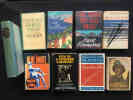
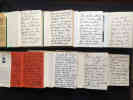
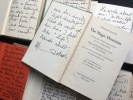



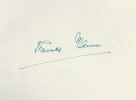












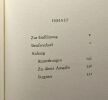

![Symmetries of Baryons and Mesons. - [NOBEL PRIZE IN PHYSICS 1969]. "GELL-MANN, MURRAY.](https://static.livre-rare-book.com/pictures/LLX/49652_1_thumb.jpg)
![Symmetries of Baryons and Mesons. - [NOBEL PRIZE IN PHYSICS 1969]. "GELL-MANN, MURRAY.](https://static.livre-rare-book.com/pictures/LLX/49652_2_thumb.jpg)

